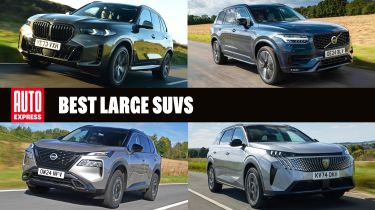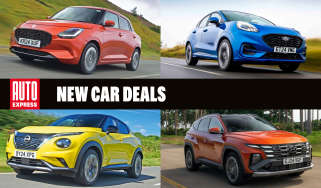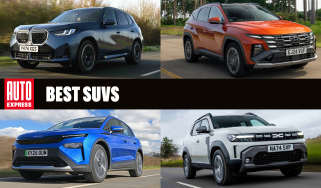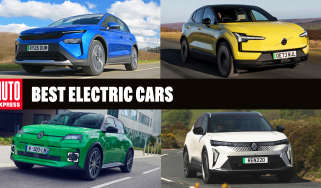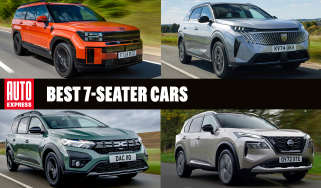Best large SUVs to buy 2025
Large SUVs are big on comfort, practicality and versatility. Here’s our pick of the best on sale now
Large SUVs are among the most adaptable and capable cars you could hope to drive. The best ones offer everything, including a family-friendly cabin with up to seven seats, a big boot, superb refinement, and plenty of luxury and safety tech. Whether you’re planning a holiday, an off-road adventure, or simply ferrying the family around, large SUVs have it covered.
Our expert road testers have examined and driven every large SUV on sale in the UK, and we’ve gathered the very best here for you to consider. We looked for vehicles with the qualities mentioned above and included models at a fairly wide range of price points. Large SUVs are big, substantial and somewhat expensive vehicles by nature so we’ve also looked for models that keep running costs in check and aren’t likely to blow the family budget with frequent visits to the fuel station or big car insurance premiums.
Given that the typical large SUV customer will usually have a gaggle of children or pets to transport around, we’ve also looked for and evaluated these cars’ useful, practical features beyond outright space - think about load securing features in the boot, charging points for devices and cabin storage space generally. So let’s get going and take a look at our expert opinion on the best large SUVs you can buy…
Compare the best large SUVs to buy
At Auto Express our expert road testers drive and rate every new car in the context of rival models to build a full picture of how they compare. The table below shows our top ten large SUVs with prices, overall star ratings, practicality scores, plus fuel types and each car’s best fuel economy figure (or range for electric vehicles).
| Rank | Name | Prices from | Practicality, comfort & boot space rating (out of 5) | Overall Auto Express star rating (out of 5) | Fuel types | Max. WLTP combined efficiency/range |
| 1 | Skoda Kodiaq | £39,000 | 5.0 | 4.5 | Petrol, diesel, plug-in hybrid | 691.5mpg |
| 2 | Kia EV9 | £65,035 | 4.8 | 4.5 | Electric | 349 miles |
| 3 | Hyundai Santa Fe | £47,890 | 4.5 | 4.0 | Hybrid, plug-in hybrid | 166mpg |
| 4 | Kia Sorento | £42,675 | 4.5 | 4.0 | Diesel, hybrid, plug-in hybrid | 176.6mpg |
| 5 | Volvo XC90 | £65,450 | 4.7 | 4.0 | Petrol, plug-in hybrid | 217.3mpg |
| 6 | BMW X5 | £73,430 | 4.5 | 4.5 | Petrol, diesel, plug-in hybrid | 313.9mpg |
| 7 | Land Rover Discovery | £64,610 | 4.8 | 4.0 | Diesel | 34.8mpg |
| 8 | BMW iX | £75,315 | 4.2 | 4.5 | Electric | 426 miles |
| 9 | Peugeot 5008 | £38,590 | 4.5 | 4.0 | Mild hybrid, plug-in hybrid, electric | 356.2mpg |
| 10 | Nissan X-Trail | £36,225 | 4.0 | 3.5 | Petrol, hybrid | 49.6mpg |
1. Skoda Kodiaq
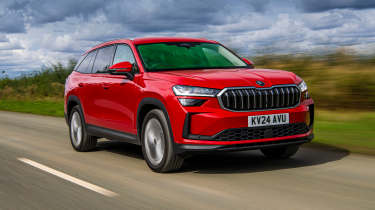
- Price from £39,000
- The overall best large SUV
Pros |
Cons |
| Good value for money | Ordinary looks |
| Generous boot space | Flimsy-feeling rotary dials |
| Clever cabin options | Fidgety ride on bigger wheels |
The Skoda Kodiaq embodies all that the Czech firm stands for: solid value for money, quality, practicality, and a few little surprises that add to the ownership experience.
You can have the Kodiaq as a five- or a seven-seater, and we’d take it with the full seven seats to have as much flexibility as possible; transporting a full quota of passengers whenever you need, along with the option to fold the third row flat and open up a huge boot space. There’s 845 litres in five-seat mode, though even with all seven seats occupied you’ve got some luggage room to play with behind.
The Kodiaq is a little unusual in the large SUV sector nowadays for still offering a diesel engine, alongside a petrol with mild hybrid assistance. The diesels can manage around 50mpg combined, while you can also have plug-in hybrid power for an electric-only driving range of up to 62 miles and a temptingly low 6% Benefit-in-Kind rate for company car users.
Skoda has always had a knack for ensuring its vehicles aren’t a challenge to drive, and despite its size, the Kodiaq is another of these. The ride could stand to be a little softer, but the handling inspires confidence and makes it a great long-distance cruiser.
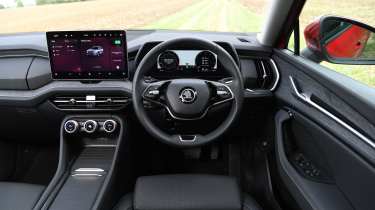
“Skoda’s ‘Simply Clever’ philosophy is perfectly suited to a car such as the Kodiaq – family-friendly features make it a useful accessory to family life.” – Dean Gibson, senior road test editor, road tested the Kodiaq in the UK.
The Kodiaq has some of the strongest competitors on the market, with the likes of the Toyota RAV4, Hyundai Santa Fe, Ford Kuga, and Nissan X-Trail all vying for your money and attention.
2. Kia EV9
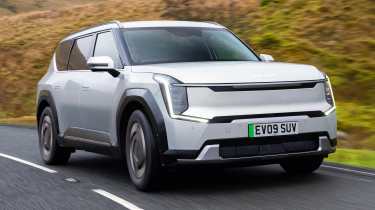
- Price from £65,035
- Best for tech
Pros |
Cons |
| Exceptionally comfortable ride | Feels unsettled at low speeds |
| Generous seven-seater practicality | Entry-level single-motor version feels underpowered |
| Impressive range and fast charging | High insurance costs |
You can’t miss the Kia EV9. It’s big, it’s bold, and it looks a bit like it should be a concept on a motor show stand.
With a cavernous interior the EV9 fits seven plus luggage, so there have been minimal compromises in packaging all that EV technology. The first five occupants get plenty of space while the third row is better suited for kids, and the driver faces a pair of large screens for all the vital information and infotainment functions.
The EV9’s headline 349-mile range (thanks to a near-100kWh battery pack) should cover most trips for most owners, even the odd longer jaunt, though a figure in the 200s is more realistic, and the EV9’s size means it’s not especially efficient. We’d stick to the single-motor model to maximise your range, as the 378bhp dual-motor version seems like overkill for family use.
There are rear- or four-wheel drive versions of the EV9, so you can decide which works best for your needs. It’s quick to recharge, too, and good to drive, though its size can be an issue in town or in car parks; you’ll find yourself sticking a long way out of parking spaces and the turning circle isn’t very tight either.
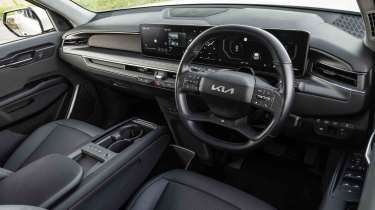
“We crowned the Kia EV9 our best large company car at the 2024 New Car Awards, so that should give you some idea of how highly we regard this electric seven-seat SUV.” – Alex Ingram, chief reviewer, road tested the EV9 in the UK.
Big seven-seat electric cars are thin on the ground but others to consider if you’re shopping for an EV9 are the Volvo EX90 and Mercedes-Benz EQB.
3. Hyundai Santa Fe
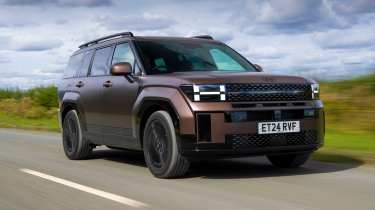
- Price from £47,890
Pros |
Cons |
| Comfortable to drive | Expensive to buy |
| Head-turning design | Noisy petrol engine when worked hard |
| Generous equipment | No diesel option |
There’s more than a dash of the Land Rover Defender to the Hyundai Santa Fe’s attitude, yet it is distinctly its own design thanks to those angular lines and H-themed headlights.
Hyundai fits the Santa Fe with seven seats as standard, which is ideal for family life as the rear pair fold to create a gigantic boot space – or fold them all down for a van-like 1,949 litres. You can even have your Santa Fe as a luxury six-seater, along with a choice of three well kitted-out trim levels.
Engine-wise you can choose from hybrid or plug-in hybrid options. Both use the Korean firm’s 1.6-litre petrol engine, which may sound on the small side for this car, but it does an excellent job providing performance, economy (a little more than 40mpg for two-wheel drive versions, a little less for the AWD), and a hushed ride. The plug-in, meanwhile, claims 38 miles on a charge, which should be useful even if it’s far from class-leading.
Related to the Kia EV9, it’s no wonder the Hyundai Santa Fe is much more agile to drive than you would at first suspect for a large SUV of this scale. It’s also extremely refined and comes packed with safety tech.
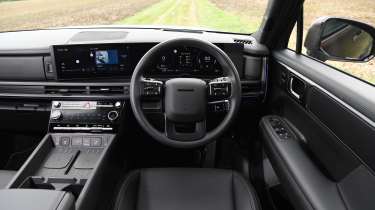
“The Santa Fe’s boxy shape is very on trend right now, but more importantly, it provides a huge amount of cabin space for both passengers and luggage.” – Dean Gibson, senior road test editor, road tested the Santa Fe in the UK.
The closest equivalent for the Santa Fe is the Kia Sorento, which is similar under the skin, though the Skoda Kodiaq and Peugeot 5008 are also in the same ballpark in terms of abilities and cost.
4. Kia Sorento
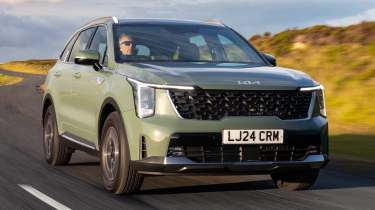
- Price from £42,675
Pros |
Cons |
| Practical, spacious interior | Uninspiring to drive |
| Practical, spacious interior | Cabin materials could be better |
| Four-wheel drive standard | Slightly unrefined engines |
It’s no surprise to us that Kia has two entries in this top 10 of large SUVs. The Sorento is simply one of the best choices you can make, and it offers an alternative to those drivers not ready to switch to the Kia EV9’s all-electric powertrain.
There’s space for seven in the Sorento, and Kia packs it full of all the tech and safety gear you could want to keep the family and others outside the car as safe as possible. The cabin is attractive too, and in true Kia fashion, the tech is pretty easy to use.
The Sorento is not offered as a full EV, instead coming with hybrid, plug-in hybrid, or diesel power. As a result, you can still have a Sorento capable of EV driving when the need arises (for 35 miles, give or take), or the simplicity of just filling up with diesel and driving for hundreds of miles, courtesy of claimed economy of up to 43.5mpg, and a lower price tag to boot.
It’s definitely a car optimised for sitting back, relaxing, and letting the miles pass underneath its wheels. Not a thrill-seeker in other words, though it doesn’t turn into a floaty mess in corners, since there’s just enough control to keep everything tidy. Some bumps do make their way through to the cabin, but generally it soaks up crumbly surfaces well. Performance is also well-judged; all versions break under 10 seconds from 0-62mph.
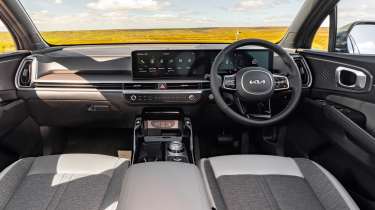
“The Kia Sorento is able to cater for a wide range of buyers with its standard-fit four-wheel drive and range of plug-in hybrid, hybrid and diesel powertrains” – Alastair Crooks, senior news reporter, drove the Sorento in the UK
The Sorento is effectively Kia’s version of the Hyundai Santa Fe above, so you should consider one of those, as well as the Skoda Kodiaq, Toyota RAV4, and Honda CR-V.
5. Volvo XC90
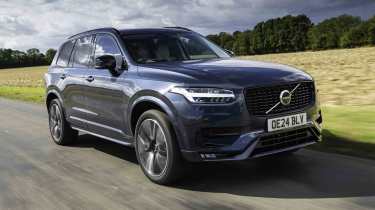
- Price from £65,450
- Best for safety kit
Pros |
Cons |
| Neat, unfussy design inside and out | Poor efficiency from petrol engines |
| Genuine room for seven adults and luggage | Light steering doesn’t inspire confidence at speed |
| Slick Android infotainment system | Showing its age next to rivals |
Anyone wanting a large SUV that speaks of quality, comfort and success has plenty of options to choose from. The Volvo XC90 does this, but in its own subtle, Scandinavian style, so don’t expect any brash design or frivolous gadgets.
At its heart, the Volvo XC90 is a brilliantly practical, seven-seat large SUV that will transport the family with ease. It serves up comfort in spades, and has a cabin finely detailed right down to the very last stitch on the leather steering wheel. It’s all been thought-out to perfection, and this shows in just how effortlessly the Volvo will slip into family life or serve as an executive car.
Opt for the B5 petrol engine, and efficiency is nothing to write home about. Volvo abandoned diesel a while back now so the XC90 really has no answer to non-plugin models from other brands in this class. The T8 plug-in hybrid’s 217.3mpg is more like it, and 30g/km CO2 means relatively low BiK for business users, though for the best economy, remember that you’ll have to make as much use as possible of the 44-mile EV range.
Driving the Volvo XC90 has a calming effect. There is a satisfying way the big Volvo goes about dealing with lumpy roads, motorways, inner cities and more. There’s also four-wheel drive to look after you on slippery winter roads, along with a whole suite of reassuring safety equipment that all seems very well integrated.
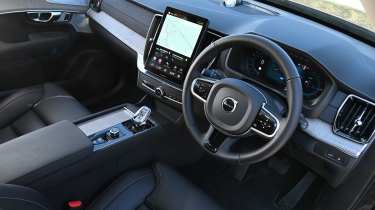
“The big seven-seat SUV is showing its age in places after over a decade on sale, but the 2024 facelift freshened things up nicely.” – Steve Walker, head of digital content, drove the Volvo XC90 in the UK.
The XC90 goes head to head with cars like the BMW X5, Mercedes-Benz GLE, and Audi Q7, while the electric EX90 may also be an option if you have somewhere to charge.
6. BMW X5
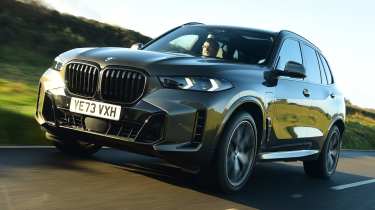
- Price from £73,430
- Best for keen drivers
Pros |
Cons |
| Comfortable and luxurious | Limited drivetrain options |
| Seven-seater option | Not the best off-road |
| Good to drive | Expensive option packs |
The BMW X5 is an established pillar of the large SUV community, and it shows in the way this car is still as desirable as it was when the first generation wowed the world in 1999.
You can have the BMW X5 with seven seats or five, and both versions are roomy. They also have a luxurious air that means the X5 can hold its head high when around models such as the latest Range Rover. BMW’s build quality has always been pretty good, but the latest models like the X5 are among the most solid-feeling in their class, and materials feel luxurious too.
Where this X5 is very different to its predecessors is that you can have it with a brilliant plug-in hybrid powertrain that offers up to 67 miles of electric driving range. Combined with a silky smooth six-cylinder engine, the xDrive50e plug-in hybrid is as good as it gets with the X5, though the diesel and petrol engines are also pretty good; the xDrive30d is capable of nearly 40mpg.
The latest X5 still displays many of the traits that made the first generation such a game-changing SUV. Like the original, the latest X5 is great to drive and you’re left wondering how BMW makes such a big car feel so nimble, with better steering and body control than just about any rival, and responsive and powerful engines. It’s also refined on longer trips.
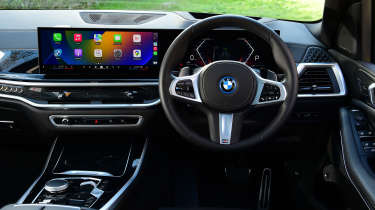
“If you're prioritising comfort, refinement and interior quality, then the X5 is an excellent choice.” – Max Adams, online reviews editor, drove the X5 in the UK.
If you’re looking at an X5 then premium German alternatives like the Audi Q7 and Mercedes-Benz GLE may also appeal, as well as the Porsche Cayenne, which is similarly nimble for a big 4x4, and as a left-field option, the Lexus RX.
7. Land Rover Discovery
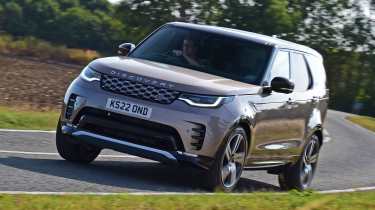
- Price from £64,610
- Best for off-road use
Pros |
Cons |
| Spacious and practical | Divisive styling |
| Comfortable and quiet | No plug-in hybrid version |
| Clever tech options | High CO2 emissions |
It’s come a long way in more than 35 years, yet the latest Land Rover Discovery continues to show the same flair as the original did with its Sir Terence Conrad-designed cabin.
Wherever you choose to drive your Land Rover Discovery, it will take you and a further six other occupants there in top drawer comfort. All Discovery versions come with a long list of standard kit that can be boosted by moving up the trim levels or ticking some choice options. Like many seven-seat SUVs the rearmost pair of chairs are less spacious than those further forward, and leave just 172 litres of boot space when they’re in place, but drop them and you’ve got 722 litres to play with.
The Discovery hasn’t quite kept up with the times like some of its siblings. No hybrid, plug-in hybrid or EV here; just a single diesel at the time of writing, the turbocharged inline-six D350, good for 34.8mpg and 213g/km of CO2. To be fair, diesel suits the Disco and owners love it for towing ability, but the car’s price and emissions will rule it out as a company car for most.
It drives like it looks, which is to say, like a big, tall car, but not in a bad way. It feels rock-solid stable on the motorway and big A-roads, another plus point for towing, and the steering responses are predictable, which helps when driving off road. It rides well, the occasional big-wheeled thump aside, and is composed in corners.
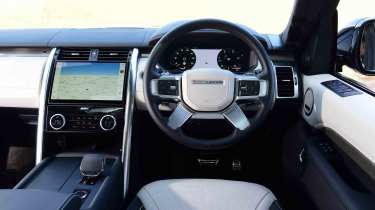
“The Discovery is impressively refined, yet it still delivers all the versatility you’d expect from an upmarket seven-seat 4x4.” – Max Adams, online reviews editor, drove the Discovery in the UK.
Those looking at the Discovery may also be tempted by Land Rover’s own Defender, though the seven-seat Hyundai Santa Fe is an option, or for a more premium feel, an Audi Q7.
Latest Land Rover Discovery deals
8. BMW iX
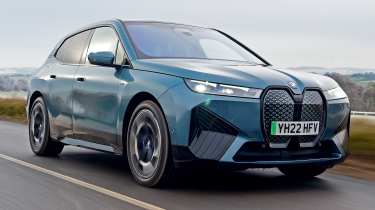
- Price from £75,315
- Best for interior design
Pros |
Cons |
| Interior quality | Smaller boot than rivals |
| Efficient | Expensive to buy |
| Great to drive | Polarising looks |
Now that discussion of the BMW iX’s styling has died down, we can appreciate it for what it is: one of the best electric SUVs on the market.
The iX has several impressive aspects but arguably none more so than its cabin. With the need to seat just five on a space-efficient EV platform it’s very spacious whichever seat you’re in, and the 500-litre boot is decent too, though it’s clear BMW has prioritised passengers over luggage. The design of the interior and the materials used are top-notch too – it’s a hugely appealing space, backed up by the effective iDrive infotainment system.
Recent updates have seen a shakeup to the iX lineup and an increase in both performance and range. The xDrive40 now does 364 miles, a massive 100 miles more than its predecessor and really increasing its appeal, while the xDrive60 does 426 miles, and the sporty M70 (replacing the old M60) goes 366 miles.
All have got quicker too, not that the iX was ever slow. The range-topping M70 is truly mighty, with 650bhp (39bhp more than before) and a 3.8-second 0-62mph time. There’s excellent handling too, considering its size and weight. We’d stick with one of the less frantic models though, and revel even more in the class-leading refinement.
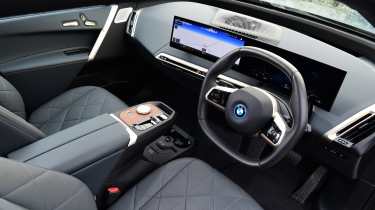
“BMW has developed a large, all-electric SUV that is supremely comfortable, great to drive and leads the way with first-rate on-board technology.” – Ellis Hyde, news reporter, road tested the iX in the UK.
Other options for those perhaps not sold on the iX’s styling include the Mercedes-Benz EQE SUV, Audi Q6 e-tron, or the new Porsche Macan Electric.
9. Peugeot 5008
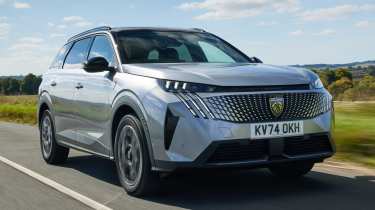
- Price from £38,590
Pros |
Cons |
| Stunning, driver-focused cockpit | Slightly fidgety ride |
| Comfortable and refined | Occasionally laggy infotainment |
| Choice of hybrid and electric power | i-Cockpit still won’t suit everyone |
Sitting in the Peugeot 5008, you wonder how the French firm has come up with something this stylish and still kept the price competitive with its main rivals. The digital i-Cockpit in its latest guise here looks fantastic, and it works really well.
The driver is put right at the centre of the Peugeot 5008’s cabin experience and it feels special in a way that you usually only find in large SUVs costing considerably more. However, Peugeot has not lost sight of basic practicality, so there’s good room in the two rows of rear seats and a sizeable boot, with a hatchback-like 348 litres even in full seven-seat form.
The 5008 doesn’t guzzle fuel either. Peugeot claims more than 50mpg even for the mild hybrid, while if you get the E-5008, then a WLTP range of 415 miles really stands out, putting it among the longest-range electric cars currently on sale in the UK. This means less need to regularly top up at expensive public chargers even on longer trips.
Peugeot has also used all of its accumulated knowledge about suspension to make sure the 5008 covers ground without being upset by any uneven surfaces. Other large SUVs are crisper in the corners, but few are as cushy or hushed as the Peugeot. Choose the all-electric E-5008 and it’s even more refined.
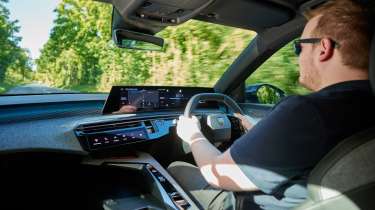
“The 5008’s starship looks are guaranteed to draw attention, but the interior design is the real star of the show. It features a 21-inch panoramic display that curves around the driver, while pools of ambient lighting illuminate the dashboard.” – Ellis Hyde, news reporter, road tested the 5008 in the UK.
The 5008 has several talented rivals, including the Skoda Kodiaq, Hyundai Santa Fe, Kia Sorento and Nissan X-Trail on this page, while the Skoda Enyaq is an alternative to the E-5008 electric version.
10. Nissan X-Trail
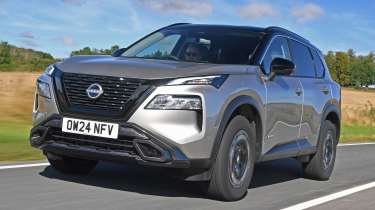
- Price from £36,225
Pros |
Cons |
| More spacious interior | Hybrid should be more efficient |
| Good levels of safety | Average three-year warranty |
| Decent residual values | Boot could be bigger |
At first glance, the Nissan X-Trail seems to be a somewhat traditional large SUV offering. Nothing much wrong with that, but you might wonder why it makes it into our top 10. It’s simple – the X-Trail is a superb family car.
Take a look inside the X-Trail and you’ll find plenty of space front and back. It also has a generous boot that can be traded for a third row of seats to lug a couple of extra folk on any trip. Nissan doesn’t quote figures for boot space in seven-seat mode, but 585 litres with the rearmost row folded makes the X-Trail practical (if not class-leadingly so) as a five-seater.
You have a choice of three different powertrains, all using a 1.5-litre three-cylinder engine. You can pick from a standard petrol unit, a mild hybrid option, or the X-Trail e-Power that uses the engine as a range-extending generator to power an electric motor for lower emissions. The e-Power setup works well, but efficiency is only average for a hybrid like this, at around 50mpg.
Comfort takes precedence over excitement in the way the X-Trail drives, but few buyers in the target market will ever worry about that. It handles town driving, B-roads and motorways with similar aplomb, and is particularly refined on the motorway, keeping noise from tyres, wind and engine to a minimum.
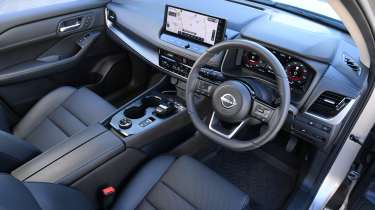
“Family car buyers will be pleased to know there have been some big improvements to the Nissan X-Trail SUV, delivering more passenger space, better cabin quality and a more extensive list of standard safety features.” – Ellis Hyde, news reporter, road tested the X-Trail in the UK.
Other cars to look at for X-Trail shoppers include the Kia Sorento, Hyundai Santa Fe, Skoda Kodiaq, and Peugeot 5008, while the Dacia Bigster is also worth a look for its value proposition.
Maximum practicality with lower emissions! Check out the best hybrid SUVs

